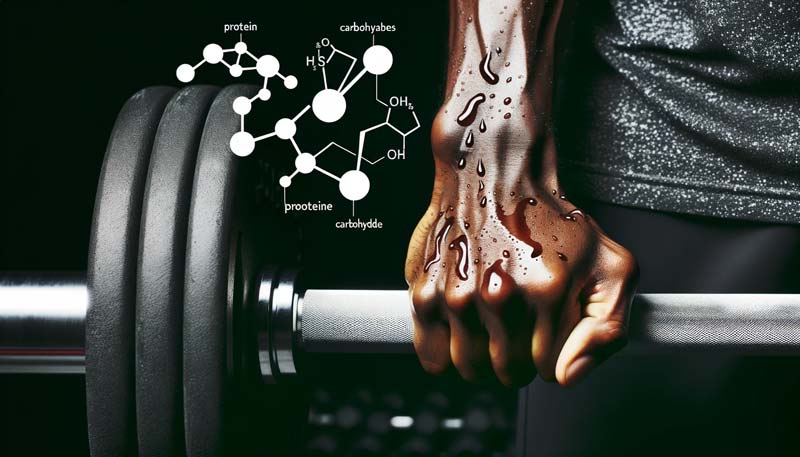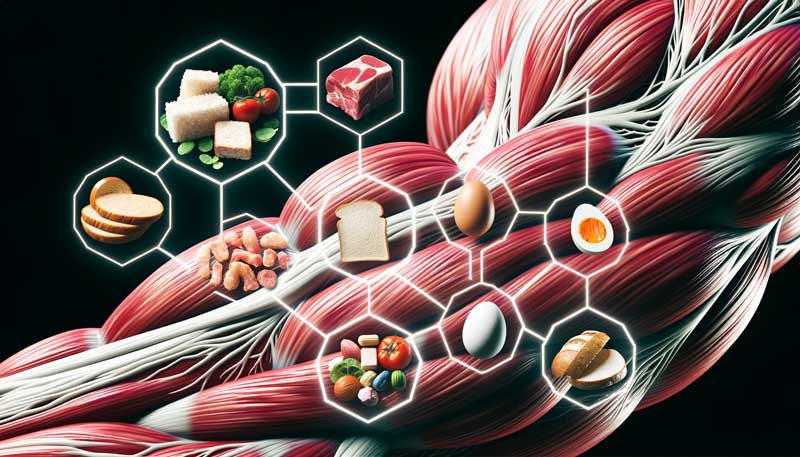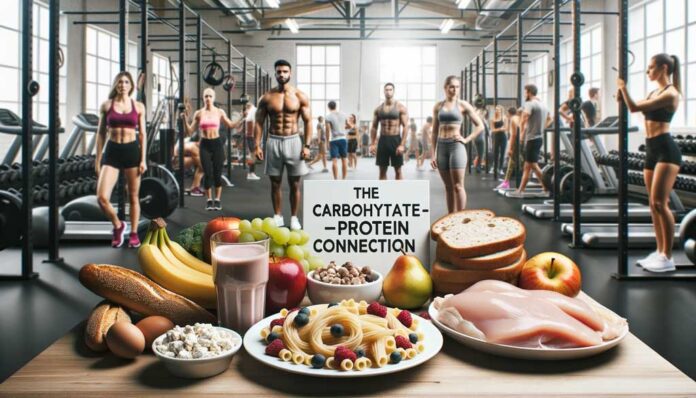The carbohydrate-protein connection in fitness is more intricate than most fitness enthusiasts realise. Throughout my years as an athlete and coach, I’ve been struck by the overwhelming focus on protein as the linchpin for achieving fitness goals.
Advice on high protein intake saturates blogs, social media, and articles, asserting that protein is the key to muscle mass and physical strength. This perspective puzzled me, particularly as an athlete who only started using protein supplements in my early 20s.
My decision to use protein wasn’t primarily for muscle gain. It was a calculated recommendation from a nutritionist who noticed my slow muscle recovery. The protein I was advised to use always included carbohydrates. As I took the nutritionist’s advice on board, I began to understand the intricate relationship between carbohydrates and protein.
The protein needs carbohydrates to efficiently deliver its benefits to the muscles. This vital connection is what many fitness enthusiasts need to pay attention to, leading to less-than-optimal results.
Another myth that needs debunking is the misconception about protein intake. The body can only retain a limited amount of protein, with the rest going down the drain. It’s a costly mistake for your wallet and fitness goals.
Suppose you ignore the role of carbohydrates as the primary energy source. In that case, your body will start using the protein you intended for muscle repair as an energy source.
What Are “Carbohydrates” and “Protein“? “Carbohydrates” are the unsung heroes that fuel your body’s engine. Think of them as the petrol that powers your internal machinery. Conversely, “Protein” is not just for bodybuilders; it’s the caretaker that helps repair the body but needs a lift from carbohydrates to do its job effectively.
In the coming sections, we’ll explore the role of carbohydrates in providing energy, discuss the supportive role of protein in muscle growth, examine real-world examples of how these nutrients work in synergy, and offer practical tips on incorporating the carbohydrate-protein connection into your fitness routine.

The Role of Carbohydrates in Energy Provision
Carbohydrates rule the roost when it comes to fuelling your workouts. They’re the go-to energy source for your muscles during moderate to high-intensity exercise. As exercise intensity exceeds 75% of your VO2max, your body leans even more on carbohydrates to keep you going. The higher the rate at which your body can oxidise carbohydrates, the better your endurance performance.
But what happens when you don’t get enough carbs? Your workout performance may nosedive. Carbohydrate availability is crucial for adequate recovery, especially when the time between exercise sessions is less than 8 hours. Lack of carbs can make refuelling ineffective, and even adding protein will only partially compensate.
Some athletes try to skirt around carbs, focusing on a protein-heavy diet. Here’s the twist: ignore carbohydrates, and your body will use that precious protein for energy. You’ll end up burning what you wanted to build.
Carbohydrate intake isn’t just about chugging a sports drink during your workout. It’s about strategic planning. The types, patterns, and timing of carbohydrate-rich meals can make or break your fitness goals.
Let’s tackle a common myth: eating carbohydrates will make you put on weight. In reality, carbs are essential for athletes. They’re stored in the muscles as glycogen, your body’s go-to fuel source. Carbs are non-negotiable if you plan on any high-intensity or long-duration exercise.
Before you write carbohydrates off as ‘bad’, consider their role in your fitness routine. They’re your energy source and key to unlocking your full workout potential.
How Protein Supports Muscle Growth
The importance of protein in muscle growth and repair is universally acknowledged, but let’s examine the science behind it. While carbohydrates are the primary fuel, protein plays a pivotal role in post-workout recovery and muscle hypertrophy, emphasising the Carbohydrate-Protein Connection.
1. The Anabolic Role of Protein:
Protein is integral to muscle repair and growth. Resistance training induces muscle hypertrophy by increasing muscle and fibre cross-sectional area. This growth is associated with protein accretion. In essence, myofibrillar proteins like myosin and actin contribute to muscular strength.
2. Protein and Post-Exercise Recovery:
Protein supplements, particularly when co-ingested with carbohydrates (CHO), significantly increase maximal carrying capacity after resistance training. This combination promotes greater muscle strength without requiring additional nuclei infusion into muscle fibres.
3. The Cortisol Factor:
Higher cortisol levels can impede the anabolic effects of resistance training. Interestingly, carbohydrate intake can attenuate cortisol levels, thus potentially contributing to higher myofibrillar protein concentration.
4. The Leucine Connection:
Certain amino acids like leucine can directly stimulate muscle protein synthesis, partly through the mTORC1 signalling pathway. Insulin helps in amino acid delivery and utilisation for protein synthesis, underscoring the benefit of co-ingesting carbohydrates with protein.
5. Practical Takeaways and the Carbohydrate-Protein Connection:
- Ingest 20-30g of protein post-exercise, ideally with carbohydrates, to stimulate muscle protein synthesis.
- Leucine-rich protein sources can be particularly effective.
- Be wary of cortisol levels; manage them through carbohydrate intake.
The synergy between carbohydrates and protein isn’t just beneficial—it’s essential for anyone serious about maximising their fitness gains. Therefore, when reaching for a protein shake, consider adding carbs to the mix, honouring the Carbohydrate-Protein Connection.

Synergy in Action: Carbohydrate-Protein Workouts
The carbohydrate-protein connection isn’t a theoretical construct; it has real-world implications for athletes and fitness enthusiasts. Let’s explore concrete examples grounded in scientific research to understand how carbohydrates and protein work in synergy.
- Endurance Athletes: In studies involving master-class athletes primarily engaged in cycling and running, a carbohydrate-protein drink (CHO-P) significantly improved time-to-exhaustion (TTE) during repeated exercise. These findings were reinforced by the enhanced recovery of parasympathetic activity when isotonic solutions were consumed during and post-exercise.
- High-Intensity Workouts: In CrossFit settings, athletes require a maximal sustainable pace known as Critical Velocity (CV). Consuming a blend of glutamine and carbohydrates was shown to prevent a decrease in anaerobic power during these repeated high-intensity efforts.
- Mixed-Modal Workouts: In the case of sports that demand both endurance and power, such as CrossFit. Consuming a carbohydrate-protein beverage can make a difference in performance outcomes.
The synergy between carbohydrates and protein goes beyond theory—it’s backed by evidence and observed in real training scenarios. Consider some practical tips to seamlessly integrate the carbohydrate-protein connection into your fitness routine.
- Improved Recovery: A blend of carbohydrates and protein enhances muscle glycogen recovery, aiding quicker bounce-back between training sessions.
- Efficient Muscle Repair: Combining carbohydrates with protein after high-intensity workouts can reduce cortisol levels, thus facilitating better muscle repair.
- Optimal Energy Utilisation: Carbohydrates ensure protein is used for muscle repair rather than being burnt for energy.
- Sustained Power Output: For athletes engaging in prolonged high-intensity exercises requiring sustained power output, the carbohydrate-protein connection is crucial for maintaining performance.
Incorporating the carbohydrate-protein connection into your workout programmes offers an array of benefits that go beyond the gym. This is not limited to what you consume but also about when and how you do it to maximise your fitness gains.

Incorporating the Carbohydrate-Protein Connection into Your Fitness Routine
The carbohydrate-protein connection is your ultimate ally to elevate your fitness game. Based on my years of coaching and athletic experience and backed by robust scientific evidence, here’s how you can seamlessly integrate this nutritional powerhouse into your routine.
1. Pre-Exercise Nutrition
Consume a pre-exercise meal 2-4 hours before your workout. The meal should be high in carbohydrates to maximise energy availability. Additionally, it should be low in fat and fibre to facilitate quick gastric emptying and absorption. My cautious foray into using protein supplements only occurred in my early 20s. Still, even then, my nutritionist insisted that any protein I consumed must be paired with carbohydrates. This is essential for the protein to be efficiently delivered to the muscles.
2. Post-Exercise Nutrition
For post-exercise recovery, opt for a combination of carbohydrates and protein. Carbohydrates stimulate muscle glycogen resynthesis, while adding protein to the mix further enhances this process. Aim for 1.0-1.5 g/kg body weight per hour of carbohydrates for 4 hours post-exercise to adequately replace glycogen stores. Add 0.2-0.5 g/kg of protein to improve exercise performance if your carbohydrate intake is less than 1.2 g/kg/h.
3. Quality of Protein
Choose high-quality protein sources rich in essential amino acids, like whey or casein. Consuming 20-40 grams of high-quality protein can significantly stimulate muscle protein synthesis.
4. Overnight Recovery
Take notice of the importance of overnight recovery. Consuming 30-40g of casein protein before sleep can boost overnight muscle protein synthesis.
5. The Balance Is Key
Professional bodybuilders are not just chugging protein; they live a disciplined lifestyle focused on a balanced diet and rigorous training. The training tears the muscles, and the combination of protein and carbohydrates helps repair them.
I’ve found that many athletes overlook the importance of carbohydrates, focusing solely on protein. But, as I learned from personal experience and extensive coaching, the key to maximising your fitness goals lies in the carbohydrate-protein connection.
Incorporating these practical tips into your fitness routine, you set yourself up for success in the gym and your wellness journey. Remember, the benefits of this nutritional strategy extend far beyond muscle growth and workout performance—they’re a cornerstone of a healthy, balanced lifestyle.
Sources
- Baty, J.J., Hwang, H., Ding, Z., Bernard, J.R., Wang, B., Kwon, B., & Ivy, J.L. (2007). The effect of a carbohydrate and protein supplement on resistance exercise performance, hormonal response, and muscle damage. Journal of Strength and Conditioning Research, 21(2), 321-329.
- Berardi, J. M., Noreen, E. E., & Lemon, P. W. (2006). Postexercise muscle glycogen recovery enhanced with a carbohydrate-protein supplement. Medicine and science in sports and exercise, 38(6), 1106-1113.
- Bergstrom, J., Hermansen, L., Hultman, E., & Saltin, B. (1967). Diet, muscle glycogen and physical performance. Acta Physiologica Scandinavica, 71(2), 140-150.
- Betts, J. A., & Williams, C. (2010). Short-term recovery from prolonged exercise: Exploring the potential for protein ingestion to accentuate the benefits of carbohydrate supplements. Sports Medicine, 40, 941–959.
- Buchheit, M., Laursen, P.B., & Ahmaidi, S. (2007). Parasympathetic reactivation after repeated sprint exercise. American Journal of Physiology-Heart and Circulatory Physiology, 293(1), H133-H141.
- Burke, L. M., Kiens, B., & Ivy, J. L. (2004). Carbohydrates and fat for training and recovery. Journal of Sports Sciences, 22, 15–30.
- Glynn, E.L., Fry, C.S., Drummond, M.J., Timmerman, K.L., Dhanani, S., Volpi, E., & Rasmussen, B.B. (2010). Muscle protein breakdown has a minor role in the protein anabolic response to essential amino acid and carbohydrate intake following resistance exercise. American Journal of Physiology-Regulatory, Integrative and Comparative Physiology, 299(2), R533-R540.
- Goldstein ER, Stout JR, Wells AJ, Antonio J, Vasenina E, Fukuda DH. (2023). Carbohydrate-Protein drink is effective for restoring endurance capacity in masters class athletes after a two-Hour recovery. J Int Soc Sports Nutr.
- Hornberger, T.A., & Farrar, R.P. (2004). Physiological hypertrophy of the FHL muscle following 8 weeks of progressive resistance exercise in the rat. Canadian Journal of Applied Physiology, 29(1), 16-31.
- Jentjens, R., & Jeukendrup, A. E. (2003). Determinants of post-exercise glycogen synthesis during short-term recovery. Sports Medicine,33(2), 117-144.
- Jeukendrup, A.E. (2011). Nutrition for endurance sports: Marathon, triathlon, and road cycling. Journal of Sports Sciences, 29(sup1), S91-S99.
- Kerksick, C.M., Harvey, T., Stout, J., Campbell, B., Wilborn, C., Kreider, R. et al. International Society of Sports Nutrition position stand: nutrient timing. J Int Soc Sports Nutr. 2008;5:17.
- Khorshidi-Hosseini, M., & Nakhostin-Roohi, B. (2013). Effect of glutamine and maltodextrin acute supplementation on anaerobic power. Asian journal of sports medicine, 4(2), 131.
- Lepers, R., & Stapley, P.J. (2016). Master athletes are extending the limits of human endurance. Frontiers in Physiology, 7, 8.
- Michael, S., Jay, O., Graham, K.S., & Terry, P.C. (2017). Higher exercise intensity delays postexercise recovery of impedance-derived cardiac sympathetic activity. Applied Physiology, Nutrition, and Metabolism, 42(8), 834-840.
- Moore DR, Robinson MJ, Fry JL, Tang JE, Glover EI, Wilkinson SB, Prior T, Tarnopolsky MA, Phillips SM. Ingested protein dose response of muscle and albumin protein synthesis after resistance exercise in young men. Am J Clin Nutr. 2009;89:161–8.
- Moreno, I.L., Pastre, C.M., Ferreira, C., de Abreu, L.C., Valenti, V.E., & Vanderlei, L.C.M. (2013). Effects of an isotonic beverage on autonomic regulation during and after exercise. Journal of the International Society of Sports Nutrition, 10(1), 1-8.
- Nybo, L. (2003). CNS fatigue and prolonged exercise: Effect of glucose supplementation. Medicine and Science in Sports and Exercise, 35(4), 589–594.
- Res PT, Groen B, Pennings B, Beelen M, Wallis GA, Gijsen AP, Senden JM, Van Loon LJ. Protein ingestion before sleep improves postexercise overnight recovery. Med Sci Sport Exerc. 2012;44:1560–9.
- Spriet, L. L., & Gibala, M. J. (2004). Nutritional strategies to influence adaptations to training. Journal of Sports Sciences, 22, 127–141.
- Staples, A.W., Burd, N.A., West, D.W., Currie, K.D., Atherton, P.J., Moore, D.R., … & Phillips, S.M. (2011). Carbohydrate does not augment exercise-induced protein accretion versus protein alone. Medicine and science in sports and exercise, 43(7), 1154-1161.
- Thomas, D. T., Erdman, K. A., & Burke, L. M. (2016). Position of the Academy of Nutrition and Dietetics, Dietitians of Canada, and the American College of Sports Medicine: Nutrition and Athletic Performance. Journal of the Academy of Nutrition and Dietetics,116(3), 501-528.
- Wang, W., Hsieh, P.L., Farrar, R.P., & Ivy, J.L. (2020). Co-ingestion of carbohydrate and whey protein induces muscle strength and myofibrillar protein accretion without a requirement of satellite cell activation. Current Research in Physiology, 2, 12-21.
- Zawadzki, K. M., Yaspelkis III, B. B., & Ivy, J. L. (1992).Carbohydrate-protein complex increases the rate of muscle glycogen storage after exercise. Journal of Applied Physiology,72(5), 1854-1859.
- Witard, O.C., Jackman, S.R., Breen, L., Smith, K., Selby, A., & Tipton, K.D. (2014). Myofibrillar muscle protein synthesis rates subsequent to a meal in response to increasing doses of whey protein at rest and after resistance exercise. The American journal of clinical nutrition, 99(1), 86-95.



